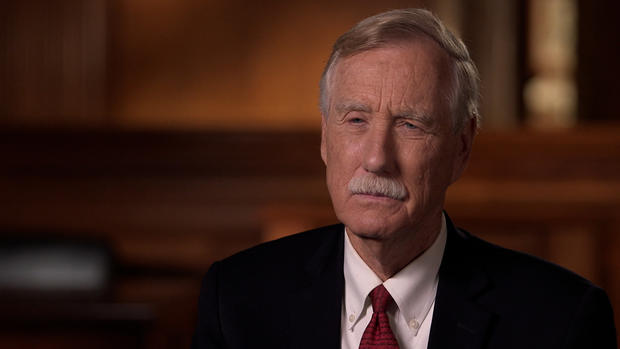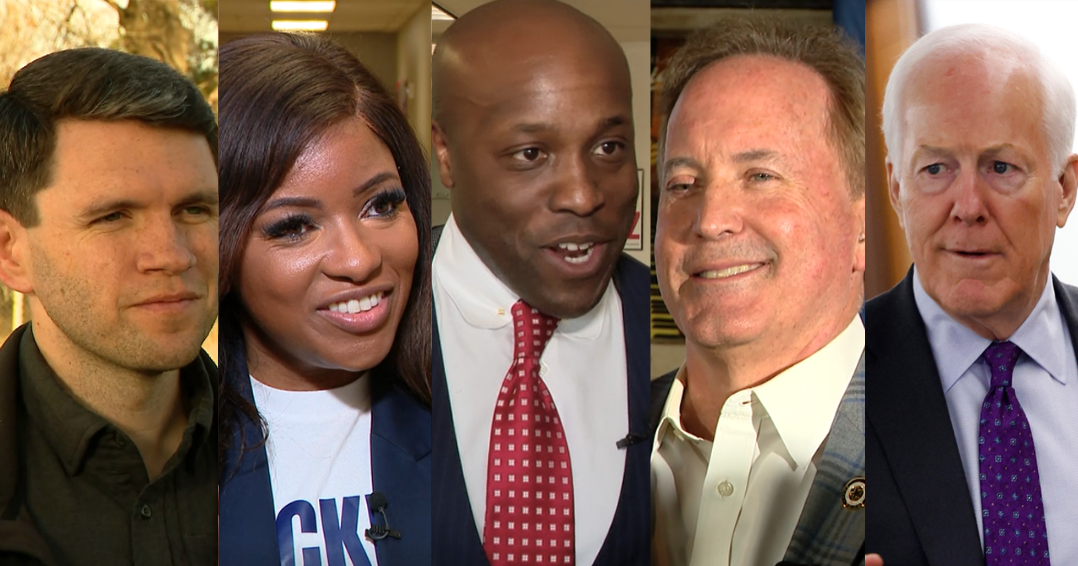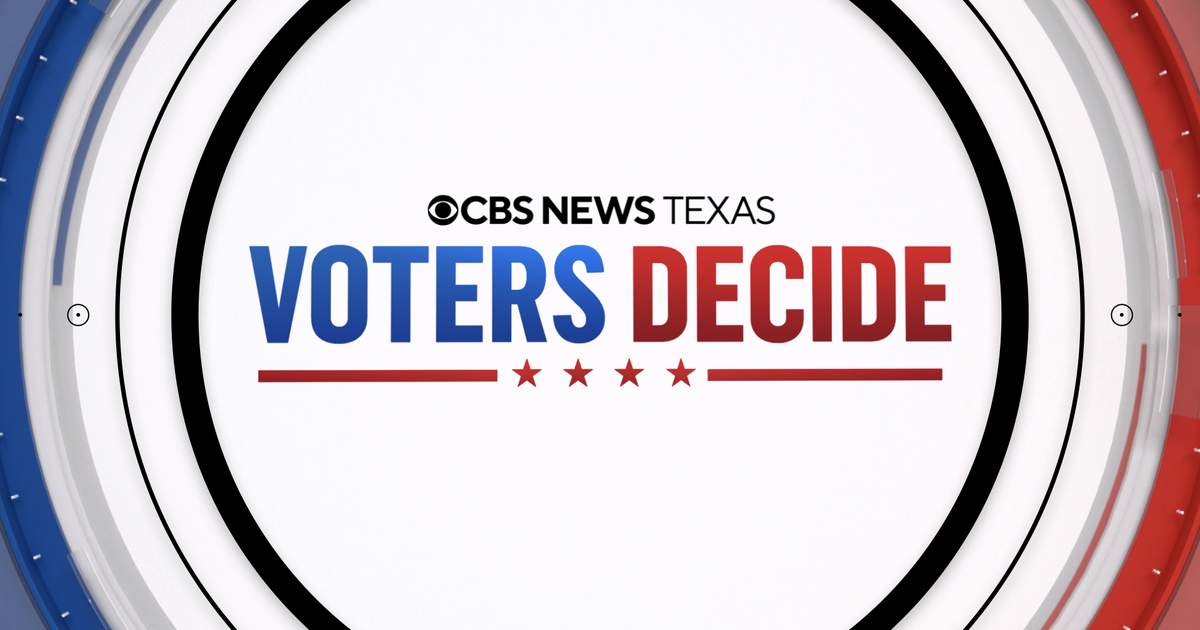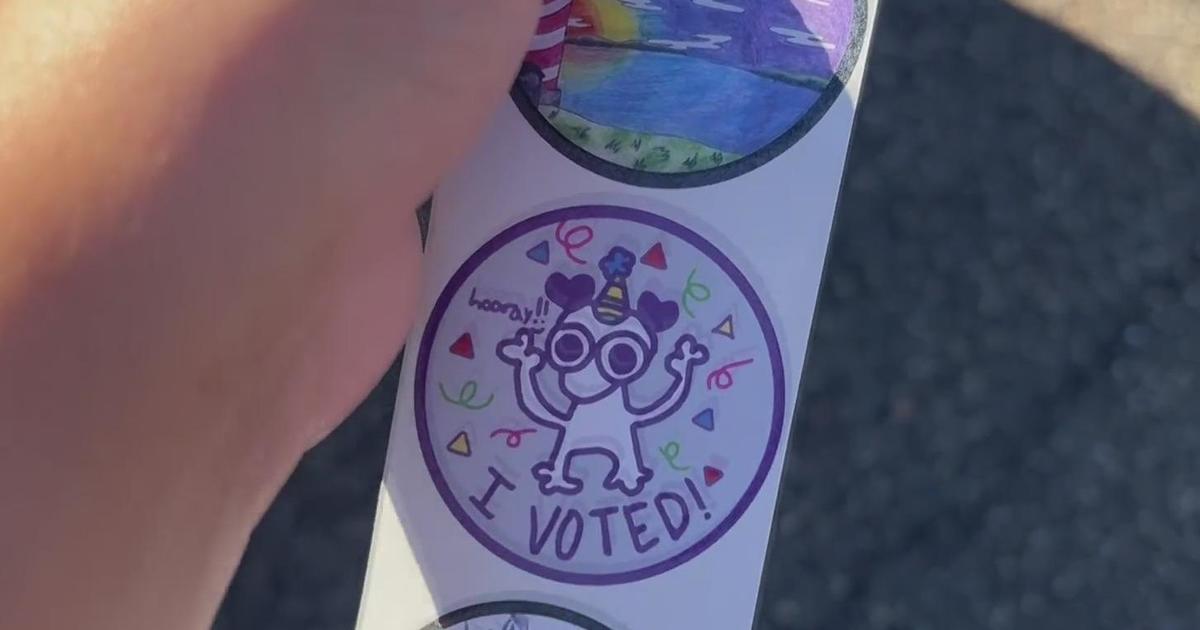Angus King: An independent in the Senate
The state of Maine entered the union by virtue of a compromise — the Missouri Compromise of 1820. Since then, Maine has been a pocket of political moderation and political flexibility, swinging left to right, and back again. In November's election, Maine was peak Maine, the only U.S. state to vote for a president from one party while electing a senator from another. At a time when "polarized" doesn't paint the depth of division in the country, we looked north and consulted Maine's deceptively powerful senator, Angus King, a registered independent, beholden to neither major party, and, at age 76, holding no ambition of higher office. His colleagues see him as a truth teller and voice of reason. And perhaps, we can turn to him as a guide for repairing the tattered fabric of both the United States Senate and the country at large.
Who's Angus King? He isn't the more prominent of the two senators from his state (that's Susan Collins). He isn't the more prominent of the two independents in the Senate (that's Bernie Sanders). He isn't even the most prominent man named King from his state (that would be Stephen, the writer). But Angus King is something akin to Atticus Finch on a Harley. A motorcycle-riding, duck-hunting, public-radio-listening straight shooter, unencumbered by party politics.
We spoke with him in his office the morning after the assault on the Capitol. He was angry with President Donald Trump.
Angus King: The first thing that came to my mind was the old quote from Hosea the Old Testament prophet who said, "They who sow the wind shall reap the whirlwind." And the president's been sowing the wind for three or four months, and yesterday we reaped the whirlwind.
Jon Wertheim: You blame the president.
Angus King: I do. Words have consequences, and the-- the higher up you are on the hierarchy, the words have more and more consequences. And the president of the United States has the bully pulpit.
He also directed plenty of anger at his colleagues, especially the 14 Republican senators who challenged certification of the Electoral College votes, a stunt, King says, that fomented the rioters. King called out by name Josh Hawley of Missouri and Ted Cruz of Texas, whom he considers a friend.
Angus King: I'm disappointed because he knows better. He's a really smart guy. I think it's interesting that he and Hawley are probably in the top 10% of IQ in the U.S. Senate. And that makes it less excusable what they did, because they knew damn well that what they were doing was wrong, and that it was-- inimical to the interests of this country.
Jon Wertheim: This Electoral College vote was supposed to be a certification, a formality. It was-- it was something else entirely. What about your colleagues who went along with this?
Angus King: They-- were wrong to do it. And it was a stunt to engrave their names on the rolls of "I'm loyal to Donald Trump." it was a profoundly unp-- patriotic act in my mind.
Jon Wertheim: Have you told them that?
Angus King: I have.
Jon Wertheim: What is that conversation like?
Angus King: Uncomfortable.
And as for the marauders...
Angus King: I don't sympathize, I don't support, I don't approve, I don't authorize what they did, but I understand it.. Because they had been told by the president, by the media that they listen to, by talk radio for months going back before the election that-- the whole thing was illegitimate. They couldn't trust the courts, they couldn't trust the Congress, they couldn't trust the media.
As strenuously as he condemns the riots, he's seen in his own state how many Americans feel that the country—and world—has passed them by.
Jon Wertheim: You-- you know these people.
Angus King: Absolutely. Listen, Donald Trump carried Northern Maine, they're profoundly alienated from our system.
Angus King: You know, in Maine, for example, we've got these small towns in rural Maine that were literally built around paper mills that were great jobs. One of the communities I can think of had 5,000 people working at the mill, and that-- now the mill's all gone. And these are people that worked hard. They did, they paid their dues. They did what they were supposed to do, and yet the world got pulled out from under them.
Ask King the source of his unique strain of politics, and he'll tell you that geography is destiny. Though he grew up in the D.C. suburbs, Angus King has lived in Maine for more than half a century. He arrived in his 20s as a public interest lawyer, and later became a successful entrepreneur. Beyond the lobster and lighthouses, he found appeal in Maine's ethos. During the Christmas recess, we ventured to America's upper righthand corner and visited him in his hometown of Brunswick.
Jon Wertheim: You've said Maine is like a big small town. What'd you mean by that?
Angus King: If you're from Maine and you stop on the New Jersey Turnpike for gas, and the car next to you has a Maine plate on it-- I guarantee within 30 seconds you can establish someone you know in common. "Where ya from?" "Waterville." "Know Joe Jabber?" "He's my cousin." (LAUGH) I mean, that's the way Maine is. People know each other. And there's still a sense of community and caring about each other.
Jon Wertheim: What do you attribute that to?
Angus King: A little bit of geographic isolation, for one thing.If you're in a small town and if you're in a business, repeat business is all there is. You've got to, as we say up here, use people right, or they're not gonna come back. that engenders-- a sense of community and-- and relationship, and-- and sort of reciprocity of-- of good will.
King made his fortune when he sold his energy consulting business in the 1990s. He figured he'd finally throttle back and put some miles on his Harley, which he uses to this day to cruise the state, visiting constituents.
Angus King: I've found you can learn from anybody. I spent a lotta time on a motorcycle, and-- you know, with a lotta guys and-- and-- and-- and women-- you know, who have different views than I-- I do. I was with a whole bunch of different people, you know. And-- and by the way, they told me, one of-- one of 'em said, "Angus, you're always gonna be a rider, you'll never be a biker." (LAUGH) Even though I had the leather jacket.
Restless, in 1994, he put up his own money to run for governor of the state, a long-shot in a field of 13 candidates. That's when king, a lifelong democrat, made a decision to run as an independent.
Angus King: I didn't feel comfortable with the-- with the Democrats on-- on the taxation, regulation side. I didn't feel comfortable with the Republicans on the social issue side, on the abortion and those kinds of things. So I said, "Hell, I think I'm gonna take a path up the middle."
Jon Wertheim: Been an independent ever since?
Angus King: Yes, sir. I used to say I have-- I have no automatic friends in the legislature. But I also don't have enemies. I have 186 skeptics.
In his first race, and in an ironic twist, he beat Susan Collins, now his fellow senator. After two terms as governor of Maine, he figured, again, it was time to retire. But in 2012, Maine's Olympia Snowe abruptly left the U.S. Senate, frustrated with the griping and gridlock. King made a bid for her seat. And, despite overtures from both parties, remained an independent.
Jon Wertheim: What does being an independent enable you to do that you wouldn't be able to do if you had to affiliate with a party?
Angus King: Well, it sort of liberates you, because you don't have to do what the party says. You don't have to worry about the party's major contributors being mad at you. It's a luxury in-- in that sense.
Jon Wertheim: You've staked out your ground?
Angus King: Yeah and I just try to look for common sense - solutions. what will work, that's what i'm interested in, rather than ideology.
In Washington, King caucuses with the Democrats, but a 2019 GovTrack ranking has him as the 42nd most liberal—or 58th most conservative—senator. And as an independent, he's able to avoid the devils deals that come with party politics.
Jon Wertheim: I've heard this described almost as a locker room in sports, where you're told you can't give the other side a victory.
Angus King: That's right. It's a pep rally.
Jon Wertheim: What's the impact of that?
Angus King: Well, the impact is to divide us into-- into-- distrustful, armed camps where it's-- everything is a zero sum game. We-- we win, and they lose, or vice versa.
Jon Wertheim: As long as the Senate is 50/50 and we have this-- this knife's edge, do you think there's pressure of-- "Hey, King, pick a party already"? Do you think you're gonna have pressure to-- have an R or D next to your name?
Angus King: I don't think so. No, because-- when I first came down here and talked to Harry Reid who was then the Democratic leader, I said, "Look. I'll-- I'll vote with you on organizing the Senate but I'm gonna make my own calls on-- on other issues. And you gotta leave me alone."
And he said, "Don't worry, we will." And in fact, in four years, Harry Reid only asked me for two votes. One I was gonna vote with him anyway, and the other I said no. Now, it-- I gotta be honest, because my Republican friends are watching this, and they're gonna say, "He's really a Democrat, come on."
Jon Wertheim: What do you say to that?
Angus King: What I say to it is that the Republicans haven't given me much to vote for lately.
King has stopped flying since the pandemic, instead he drives the nine hours between D.C. and Maine, where his wife, Mary, lives and works, as do three of his five kids. When he returns to Washington on January 20 after this recess, it may barely look recognizable. New president. And after last week's Georgia run-off, new party controlling the Senate.
Jon Wertheim: Does a unified government, same party, House, Senate, White House, does that help or hinder this healing we've been talking about?
Angus King: If the Democrats had 60 and could literally pass whatever they wanted, that would be an entirely different situation. It's still gonna require-- bipartisan work. And I'll tell ya who the real winners are, are people like Susan Collins and Lisa Murkowski-- I hope myself, Joe Manchin.
Jon Wertheim: Why?
Angus King: Because we're in the middle and can have an influence in both directions….
Jon Wertheim: You-- you're a football fan?
Angus King: Yes sir.
Jon Wertheim: Seems to me positioning yourself between the 40-yard lines now is-- is suddenly a fairly healthy place to be
Angus King: Compromise is the essence of-- of human experience. And by the way, the constitution itself is full of compromises. The-- the U.S. Senate was a product of a compromise.
And Senator King has advice for how his colleagues on the left might deal with the 70-plus million Americans who voted for Trump.
Angus King: There's a term I've always liked called "eloquent listening." They have to be listened to, and we have to try to understand what's going on. it's cultural and somewhat economic. I mean, it's a very complicated matter, but we can't just dismiss it--
Jon Wertheim: Are you concerned that some of your colleagues on the left are going to govern with-- with an element of-- of retribution? That crassly, you know, karma is a you know what, and after four years of a president they've reviled and of Republican senators they think have been enabling, and an assault on your place of work this week, that-- this pendulum's gonna whip back in the other direction.
Angus King: You can't just say, you know, "No harm, no foul," and pretend nothing ever happened. On the other hand, to-- to be motivated by retribution or-- or some element of-- of vengeance or some-- I-- I-- I don't think that's productive.
Jon Wertheim: How do you thread that needle? You don't want people to feel unheard, but you also don't want to give credence to what isn't factually true. Objective truth has to matter.
Angus King: It does, and-- and you-- you, I think you just gotta try. But-- cramming things down their throat isn't certainly gonna help.
Jon Wertheim: How do we import these qualities of Maine, of-- of placid and-- and measured and reasonable Maine? How do we import that to Washington, D.C.?
Angus King: I think those qualities exist all over America, but in-- in-- in many parts of America, and we just have to try to ring the bell of common sense.
Produced by Michael Karzis and Julie Holstein. Broadcast associate, Elizabeth Germino. Edited by Matthew Lev.







